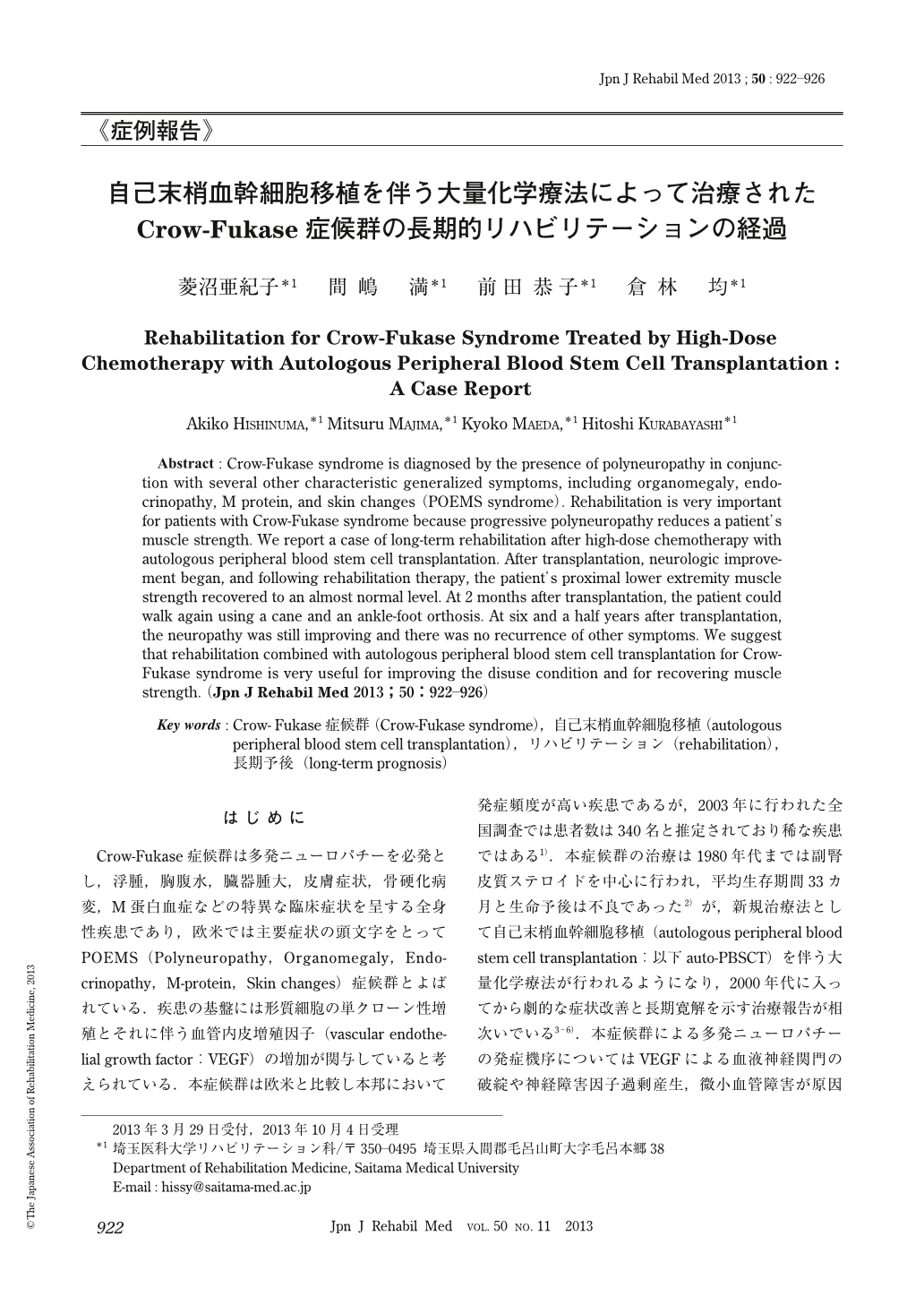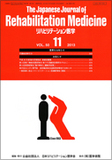Japanese
English
- 販売していません
- Abstract 文献概要
- 1ページ目 Look Inside
- 参考文献 Reference
はじめに
Crow-Fukase症候群は多発ニューロパチーを必発とし,浮腫,胸腹水,臓器腫大,皮膚症状,骨硬化病変,M蛋白血症などの特異な臨床症状を呈する全身性疾患であり,欧米では主要症状の頭文字をとってPOEMS(Polyneuropathy,Organomegaly,Endocrinopathy,M-protein,Skin changes)症候群とよばれている.疾患の基盤には形質細胞の単クローン性増殖とそれに伴う血管内皮増殖因子(vascular endothelial growth factor:VEGF)の増加が関与していると考えられている.本症候群は欧米と比較し本邦において発症頻度が高い疾患であるが,2003年に行われた全国調査では患者数は340名と推定されており稀な疾患ではある1).本症候群の治療は1980年代までは副腎皮質ステロイドを中心に行われ,平均生存期間33カ月と生命予後は不良であった2)が,新規治療法として自己末梢血幹細胞移植(autologous peripheral blood stem cell transplantation:以下auto-PBSCT)を伴う大量化学療法が行われるようになり,2000年代に入ってから劇的な症状改善と長期寛解を示す治療報告が相次いでいる3~6).本症候群による多発ニューロパチーの発症機序についてはVEGFによる血液神経関門の破綻や神経障害因子過剰産生,微小血管障害が原因として考えられている7)が,まだ不明な点が多い.病理学的には節性脱髄と軸索変性が混在している8).auto-PBSCT導入後に神経症状の明らかな改善が認められ,治療前に歩行不能の3例が1年後に歩行可能となっていたとの報告や4)車いすに頼っていた3例が治療後に歩行能力を再獲得したとの報告9)があり,多発ニューロパチーに対しても有効な治療であるといえる.しかしいずれの報告も神経内科,血液内科からの報告であり,リハビリテーション(以下,リハ)の内容の詳細は記載されておらず,筋力や歩行能力の長期的な経過についても明らかではない.重度の末梢神経障害のために日常生活動作が大きく制限されることが多いこの疾患において,リハの果たす役割は重要であり,今回我々は,auto-PBSCTを伴う大量化学療法によって治療されたCrow-Fukase症候群の1例における7年間の筋力,歩行能力の経過を追跡したので,そのリハの経過を電気生理学的所見も含めて報告する.
Abstract : Crow-Fukase syndrome is diagnosed by the presence of polyneuropathy in conjunction with several other characteristic generalized symptoms, including organomegaly, endocrinopathy, M protein, and skin changes (POEMS syndrome). Rehabilitation is very important for patients with Crow-Fukase syndrome because progressive polyneuropathy reduces a patient's muscle strength. We report a case of long-term rehabilitation after high-dose chemotherapy with autologous peripheral blood stem cell transplantation. After transplantation, neurologic improvement began, and following rehabilitation therapy, the patient's proximal lower extremity muscle strength recovered to an almost normal level. At 2 months after transplantation, the patient could walk again using a cane and an ankle-foot orthosis. At six and a half years after transplantation, the neuropathy was still improving and there was no recurrence of other symptoms. We suggest that rehabilitation combined with autologous peripheral blood stem cell transplantation for Crow-Fukase syndrome is very useful for improving the disuse condition and for recovering muscle strength.

Copyright © 2013, The Japanese Association of Rehabilitation Medicine. All rights reserved.


